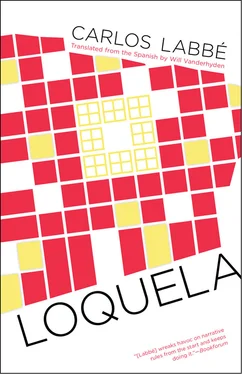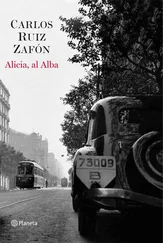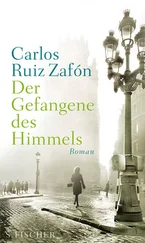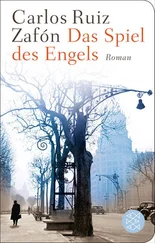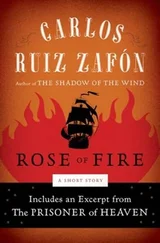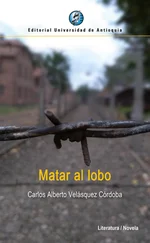After reading the ekphrasis, Alicia bent closer to my ear: liar, the only artifice is in the eye of the girl who watches, in her cold eye, for she doesn’t want to know that blood still circulates through her, that above his head the shadow of a leaf is falling, detached from aromas of the university entrance; that if the girl is a light, all lights go out; that the ekphrasis is writing and all writing is linear, it has to end, it ends like the silence, and like the circulation of the blood that pauses to keep my eye from lingering on the image of He Who Is Writing the Novel, not because his young body is now floating in a glorious state of permanence, but because he slips on the step, clumsy, disbelieving, and goes down, his head cracking open against the only solid thing, and the running blood hurrying to finally stop running.
He stumbles. Catching himself when his pupils manage to look up and see me once again: she’s been sitting there writing at the same time every day since we returned to classes. He Who Is Writing the Novel decides that his experiment is ending, he won’t come through that gate again to see if the albino girl is watching him, because — when I stand up in the moment he loses balance — he has proven that she is. He comes over to tell me that he’s writing a novel in which the important thing is the persistence of bodies, in which, he’ll tell me a few weeks later, he asks himself what would be left of me in him if he’d managed to touched me. I’m afraid, alone, and attracted by that hand as it rises toward my body. Alicia’s intervention shatters the picture, and those pieces begin to move with me until they attain the velocity of my writing, so fast that if you or I fall to the ground we won’t ever be able to say that we got up.
He Who Is Writing the Novel waited for me to dry my mouth enough to speak before smiling, warming up, putting his arms around me without making it overly obvious that he wanted to touch me, and he said: what you’re doing is precisely what I’m unable to write. According to him, he needed me to speak concisely about a painting that interested him greatly, in a text that would be read in public, because it would form part of the manifesto of an artistic movement that would leave everyone in Neutria, everyone in the world, with closed eyes — I expected him to say with open mouths. He said he needed my help, he looked me in the eyes and then, don’t ask me why, I kissed him quickly on mouth, just lips. He Who Is Writing the Novel was stunned, repeating barely comprehensible phrases; that love and work don’t mix, like soul and body, I responded, trying to help him, but he was speechless. I promised I wouldn’t touch him again, that we wouldn’t spend our time fornicating whenever we saw each other. He trembled and in that moment I really loved him; I loved him like a child, that’s what I told Alicia. Like an adolescent would be better, she specified. Perhaps that’s why her stories are incomplete.
I haven’t told you about my earlier visits to the professor’s house yet. He had invited me over twice before you took me: Alicia came along both times, she can attest to the fact that the professor did nothing to force me, rather it was I who told him to stop talking as I got on top of him, not caring anymore about Alicia’s eyes on the painting of a beach and its waves that occupied the entire surface of the living room wall; the armchair was moving, the sea was no longer restrained by the strokes of the paintbrush — I knew then that it was the professor who’d painted it — and it began to recede and get me wet. I admit that the professor’s mouth irritated my lips, yet his hands grew old and then vanished when I turned my back on the ekphrasis: yes, at the cost of my degradation, of the physical effort to separate body from soul— delusion from delight , we called them as little girls, laughing, me and Alicia — the painting hanging on the wall breaking apart in time, along the opposite path I was going to perpetuate the intangible. And then, before the wave painted on the wall broke with its powerful aroma, I got up off the professor’s body, got dressed, washed my hands, looked into his old face to verify that he’d planned the whole thing: I was just a useful body, he said to me the first and the second time. In particular I remember his fingers pressing against the wall where he’d painted the seascape, the soft way his index finger slid across the line of the horizon when he asked that we forget about what’d happened, and this explains why I felt nothing the afternoon He Who Is Writing the Novel invited me to visit the professor’s house so we could look at the painting that he wanted to write about. Just then I realized that the wall where the oil of the seascape had mingled with my sweat a few months before had been meticulously blotted out, and over it there now hung a small canvas.
I don’t expect this letter to become a series of notes about my life, I’m not going to tell you about how I get up, come and go, climb the stairs, and enter the bathroom with nothing to do there, stare at myself in the mirror so I don’t have to look at my actual self. Violeta is my enemy and Violeta is me: alone in my grandmother’s house, abandoned by Alicia, waiting for you, but you won’t be coming to hold me, to cover me with your body and its heat. Though it’s guaranteed that you will come: you’ll open the door, and without approaching you’ll touch me from afar, I’ll fall down wounded, me alone. And at no point will you have moved from the doorway. I just need for you to imagine that I raise one hand from the notebook, that you take it, that together our fingers collapse on the bed and stay there, entwined; if I become something more than the dead body at the beginning of your detective novel, the pages will open up so that any person walking by on the street can look in and stand there motionless watching how I’m writing at this table in the moment that you open the door and take aim.
Josefita had pulled back the covers of her parents’ bed and lay down to sleep and watch TV until they got home from a dinner party at the house of some friends. Mesmerized, she checked the time on the bedside table clock when she was woken by the sounds of the car parking, the key turning in the lock, and her father’s voice saying something. She buried her face in the big pillow to seem soundly asleep while hearing every single one of their interminable footsteps, until her father lifted her in his arms and she understood nothing yet knew perfectly well that they were carrying her to bed.
Carlos, lying next to his sister, pressed a button on the remote control, searching for a movie on TV. Josefina had gotten up and was pushing open the closet’s enormous sliding door; she knew her mother kept her grandmother’s trunk, a couple of fur coats she never used, and a whole collection of family photo albums in the back of the closet. Carlos asked her what she was looking for while she silently flipped through the albums one by one, tossing them onto the bed. Written on the covers, in their mother’s lovely handwriting, was the year the photographs were taken. Ugh, said the girl, too old. Carlos said nothing, thinking that in those garish snapshots he was more or less the same age as his sister. Josefa continued doing her thing: she’d open an album, catch sight of the first photo and toss it aside impatiently, picking up another. Apparently she wasn’t looking at the photos for the fun of it, even though she loved doing that too; instead, Carlos deduced, she was trying to find one photo in particular. He repeated the question: what’re you looking for? Josefina paused and said, one from when she was a baby. He put a photo in front of her from when she was around a year old, with a spot of hair and a surprised expression — taking your first steps in the living room of the house in Pocuro, he explained. She immediately opened another album, closed it, grabbed a third, protesting that she was already big in that one, that she needed one from when she was a newborn. They reviewed the photos carefully and could only find Josefina smiling at the camera, two years old, with a beach hat and chair on the sand; a dozen similar polaroids: her yawning around five, raising a hand around three, waking up, eyes barely open around four years old. The girl twisted her mouth and sat down silently on the edge of the bed, staring at the TV. Carlos waited for her to say something; he knew she wasn’t paying attention to the movie that’d begun about an hour before, she was thinking about something else. Without turning around, she muttered that she knew she was adopted. It took Carlos a second to understand what she was saying and then he smiled: Don’t be silly. Josefina turned to face him, furious, like he was to blame; then why wasn’t there a photo of her as a newborn like everyone else has at home, she said. Carlos responded calmly that she shouldn’t be so stubborn, that he’d seen her in the clinic, bald and red, less than a day old, sleeping in a cradle next to their mother, who, because of her, was very tired. That she shouldn’t be ridiculous, she looked so much like their father and like him. Josefina got the point. She’d never really believed she was adopted, what happened is that her friend Cata’s parents, just last week, had told her that they weren’t really her parents, and all because she found a photo where she appeared in the arms of other people.
Читать дальше
